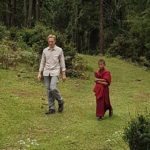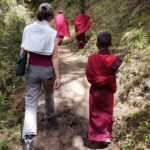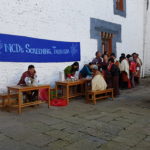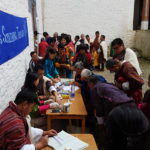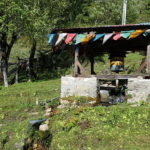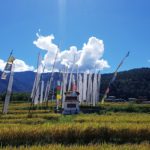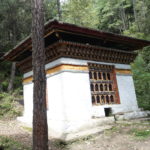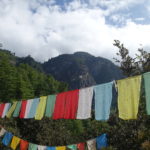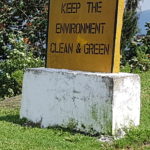While many other cultures are steered along the Gross Domestic Product (GDP) as an indicator for the development of the country, Bhutan takes a little bit a different approach.
Of course people in Bhutan are also motivated by and keep an eye on their financial situation, but overall many more factors are taken into account. Both on small scale by everybody individually as well as by the government.
First of all you can really see a feeling of belonging together between people on the streets, much more than in our western cultures. There is only a small number of people in the world speaking Zhongka (the local laguage) making conversations between each other a little different and makes them “special”, but its not only that…
It all starts from the top
Some years ago his majesty, the king of Bhutan clearly expressed his understanding of a successful state: Making its people happy!
This still today is the foundation of the governments interest in what makes people happy. And it trickled down through all levels of the government as well as into business and private life of people. Advantageous was of course also Buddhism as the prevailing religion, which is a lot about doing something good for your karma – opposed to “forbidden things” in other religions that you need to ask forgiveness for.
What makes people happy of course varies widely, but it starts with some basic necessities.
The basics for happiness
Sufficient and good food with nobody starving. Sounds for Westerners like a no-brainer, but for a 3rd world country is a huge effort. During our journey within the cities and in the country-side, we didn’t see or meet anybody in desperate need. In fact, when our guide offered the young monks on the pictures above to buy them some food after walking some way with us, some of them declined as they were not hungry. Overall people live on a healthy diet, consuming very little meat, but instead a lot of fresh vegetables and fruits. All of which can be considered organic, as neither artificial fertilizer nor pesticides are used.
Education is another fundamental factor, equipping everybody in the society with knowledge to develop further. Enabling children to strive for a better live than their parents had. To do so, Bhutan has a comparably good and rigid school system, which is free of charge to everyone. It covers all children, including those in remote areas, either served by public schools or within monasteries. And English is not only learned as a language, but some subjects are completely taught in English.
The government has also established a (basic) healthcare system, making medical facilities available also in remote villages. And what goes for the people also goes for their precious “family members”, i.e. animals for farmers, which have access to veterinarians. This is all free of charge as the idea is to take away as many worries as you can. When being sick yourself or having a sick family member (incl. those with 4 legs), at least there should not be the worry about money to afford a treatment.
The importance of a spiritual living is obvious in Bhutan, just looking at the sheer number of prayer wheels, flags and stupas wherever you are in Bhutan.
A good and healthy environment not to be forgotten. There is very little pollution to be seen in Bhutan. All electricity comes from renewable energy sources, mainly water power. The idea is that in a polluted environment it is more difficult to live a happy live. And also people care about not having too much unnecessary stress. One example is our guide Tenzin, talking about not having taken a better payed but far more stressful job some time ago.
A comprehensive measurement system
The topics mentioned above are by no means covering all aspects of happiness, but some fundamentals we could clearly see and feel while visiting this somehow unique country.
If you are really up for the details, you should read about their Gross National Happiness index. The government is conducting a regular survey to understand the most important needs in order to adapt government plans and evaluate success of past measures taken.
The survey covers many more aspects, aiming to take a holistic approach towards happiness factors and give equal importance to non-economic aspects of well-being. You can find questions about the sort of toilet available, the material of the roof as well as the perceived health status. Overall 9 major areas are covered: Living standards, education, health, environment, community vitality, time-use, psychological well-being, good governance, cultural resilience and promotion.
Putting it in practice
In reality Bhutan is not a country for dreamers… people still have to hard earn their living and there is no exemption from fines for speeding by the police just to be “more happy” *smiley winking*
But caring for others you meet along the way, being friendly and helpful to others on the road, or offering young monks something to eat when you meet them, are the small obvious positive attitudes visible in everyday life.
Additionally its a very safe environment, there is no need to be concerned about yourself or your belongings. People will rather bring your things back to you, when you forget them, than taking them away.
Doing things with a smile on your face makes a difference. And nearly everybody does this, all the time, be it work related or private. Seldom we met so many locals smiling towards us, making us feel welcome *smiley smiling*
Maybe we should start thinking about at least some of these things as well more often in our fast-paced world *smiley angel*
After some preparation and an adventurous arrival in Paro, it was a great experience seeing and experiencing the small bits and pieces of the overall goal to be happy in peoples’ daily live *smiley smiling*


